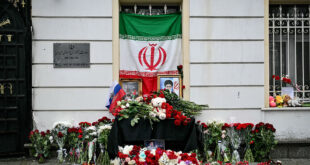In recent months, various factions of the Iranian regime have unanimously stressed that the regime’s legitimacy is not being challenged even as the turnout in the presidential election declines. For the international community, this low turnout is a sign of the regime’s instability. It calls into question whether negotiating with the mullahs’ regime is worth the effort, based upon its shrinking support among the Iranian people.
Mesbah Yazdi, a member of the Expediency Council, said: “Democracy, which is original for Westerners, is only a tool for us. The people’s vote does not bring us legitimacy … In the Islamic government, the people’s vote has no legal validity, neither in the choice of the type of political system of the country, nor in the validity of the constitution, nor the election of the president and the election of Committee of Experts and the leadership.”
On the other hand, others point to this low turnout as a sign that the regime lacks the support of the Iranian people, which could put its power in jeopardy. A low turnout demonstrates that the Iranian people could be ready for change, and an uprising could occur.
“If the (low) turnout in the 2019 elections (parliamentary elections), which was unprecedented in the 42-year history of the regime, is repeated in the year 1400 (Iranian calendar, equivalent to 2021) presidential election, and people elect the head of the 13th government with low votes, will seriously challenge regime’s legitimacy. All political factions, groups, and government institutions must think of a way to prevent the vote from falling in any way possible. So regardless of who and from which political group wins the upcoming election, the turnout is important.” Etemad Newspaper, Oct. 8, 2020)
According to state media, the Morning Star, the turnout for the parliamentary elections in Tehran was 16 percent. In other cities, this figure has been lower. Many of those who voted feared losing government subsidies and benefits. There is a rumor in Iran these days that anyone who does not vote will not be vaccinated.
“Low participation is considered as a warning for the regime,” said a member of the Expediency Council. He continued: “You see those who want to overthrow the regime are announcing that no one should participate in the elections! I consider this (situation) dangerous for the Islamic Republic.” (Mohammad Sadr – May 20) “The current situation” threatens the security of the system and provides the primary fuel for the overthrow,” the Resalat newspaper wrote on May 20. The situation in Iran is like a barrel of gunpowder that the slightest spark can cause a large fire.
After the two uprisings of November 2017 and December 2019, the regime saw firsthand the concerns of the Iranian people. Instead of focusing on meaningful change, the regime went into an oppressive mode. After the peaceful demonstrations of the insurgent youth in 2019, according to Reuters, 1500 people were killed by resistance units. These units have expanded rapidly in Iran. Those who support the Iranian democratic opposition, based on creating a republic by the people’s votes and the separation of religion from the government, have boycotted the elections. A 19-year-old, whose mother was killed in the 2019 uprising acknowledged that people’s votes under the regime did not affect Iran’s people over the past 42 years. “Guarantee the future of your children by boycotting this election,” she said.
The head of the judiciary, Ibrahim Raisi, is one of the presidential candidates. He is known for his direct role in the 1988 massacre, in which 30,000 political prisoners were executed during a hot summer. He was a key member of the “Death Commissions.” The members of the Death Commission summoned political prisoners and asked them a few questions. If the prisoner insisted on his/her beliefs, he/she was taken to be executed. The sentence would have taken just a few minutes. All the upcoming presidential candidates are active participants in the regime’s 42 years of criminal activities. In the eyes of the people, any election under the rule of the mullahs has no legitimacy.
Iranian resistance units across the country have called for a boycott by writing slogans on city walls or distributing leaflets in public places. In response to the nationwide movement of the resistance units, Ashtari, the police force commander, indicated the establishment of electoral security both in cyberspace and in real space. He added, “Insult and defamation to try to disappoint the people from the elections and any action that is against the law; the police will identify them and deal with them according to the law.” (Source: News Network TV 2/29/140)
In a situation where the regime tries to impose fear and repression, the resistance units aim to break that atmosphere of terror prevailing in society. They give hope to the people who are burning in the fire of terror, poverty, and pandemic. The question is whether the international community will hold the regime accountable and support the Iranian people.
 Eurasia Press & News
Eurasia Press & News



